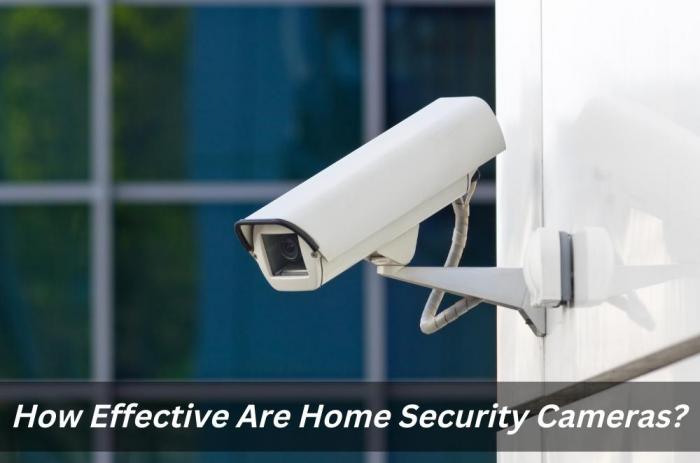
How Effective Are Home Security Cameras?
Are home security cameras really worth their price tag? There are so many different types and brands on the market that it can be difficult to know which one is right for you, and what features are important.
The best way to find out is by reading a few reviews from real people who have used them before. If you want to learn more about how effective they are, read this article carefully. It will give you some tips as well as help you decide if buying a security system is the right move for your home.
The first thing to consider when looking at video surveillance products is whether you actually need them or not. Many people assume that once they get burgled, then video surveillance is necessary.
However, there are other methods of protecting your property. These include installing good locks, alarms, lighting and even putting up a sign saying 'Burglars Beware!' A lot of burglaries happen because thieves are able to open doors with keys, and often enter through windows too.
If these things don't work, then a CCTV camera may be useful in catching someone breaking into your house. This could result in an intruder being arrested and charged with burglary. In most cases, though, you'll only see footage if the person has broken into your home already. You won't be able to catch someone trying to break in after hours.
Range of Security Systems
Smart home devices are becoming an integral part of our everyday lives thanks to several breakthrough technologies. They range from voice assistants such as Amazon Alexa and Google Assistant to smart locks, thermostats, lighting systems, heating systems, etc., and each of them comes with its unique features and pros and cons.
Home security cameras take advantage of technological advancements to provide homeowners with high-definition video surveillance services. If you want to get the best value out of your home security camera investment, however, you should consider the following recommendations.
Innovative Technology
A great way to make sure that your home security camera installation works perfectly is to use innovative technology. Some manufacturers offer options like motion detection, night vision, auto record, zoom, pan, tilt, and other advanced features that ensure that you receive a quality service.
In addition, some home security camera models allow users to remotely control their system via smartphone apps. This allows you to view live footage on your mobile device while working elsewhere.
It's also important to choose a model that offers multiple connection options. For example, if you're planning to use your home security camera outside the home, you might need to connect it to the internet using a router.
Image Quality
Another vital aspect of choosing a home security camera is ensuring that the image quality is high enough for viewing purposes. The resolution of the camera should be 1280p HD at least. If the resolution falls below this, the images will appear blurry.
When selecting a home security camera, it's also helpful to look at the number of times per second the camera can record. Higher frequency rates let you capture faster action sequences, which makes the footage easier to review later. On the other hand, lower frequencies let you save time but limit the amount of detail that you see.
Cameras that offer both higher and lower frequencies are usually better than those that come with just one setting.
Camera Range
You also need to think about what type of coverage area you need. Most home security cameras have two or more different ranges: indoor and outdoor. This ensures that you don't miss any activity occurring inside or outside the home. It also saves you money because you aren't paying extra for services that you don't require.
Most of today's home security cameras are weatherproof, making them ideal for use outdoors. However, they can still be used indoors if they have infrared emitters built into them. Infrared lights are invisible to humans, but they do reflect off objects when there is movement nearby.
The range of a home security camera is determined by how far away the camera is placed (and therefore, how much light pollution it receives) and the angle at which it faces relative to the object that it is monitoring. A camera in an upstairs window facing away from the ground is likely to cover fewer people and things than a camera mounted near the front door.
For maximum protection, a good home security camera must offer 360 degrees of coverage. That means that it needs to face all directions, including above the roof line.
Motion Detection
One of the most common ways to increase the effectiveness of a home security camera system is through motion detection. Motion detection lets you know if anyone enters or leaves the house without having to manually monitor each camera.
Some home security camera systems even go beyond basic motion detection. They can recognize specific movements such as footsteps or voices, alerting you whenever someone approaches or departs.
While traditional motion detectors work well, they can easily fail to detect certain types of movement. You'll want to avoid relying on them exclusively.
A home security camera with integrated night vision technology is another option worth considering. These cameras allow you to clearly view your property at night thanks to their ability to detect light levels.
In addition to detecting movement, some models can identify and classify what kind of movement triggered the alarm. This allows you to tailor your response accordingly.
Home security systems can take many forms, but they all share the same goalkeeping intruders out of your home while giving you peace of mind. Make sure that you choose a model that will meet your needs and budget before buying.